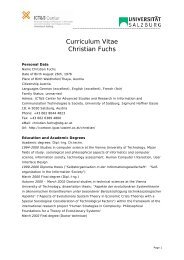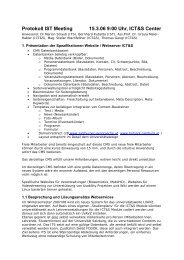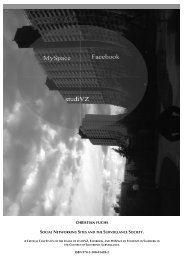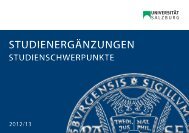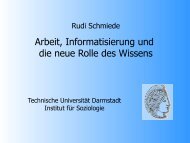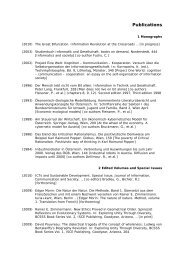ICTS AND SOCIETY: THE SALZBURG APPROACH - ICT&S
ICTS AND SOCIETY: THE SALZBURG APPROACH - ICT&S
ICTS AND SOCIETY: THE SALZBURG APPROACH - ICT&S
You also want an ePaper? Increase the reach of your titles
YUMPU automatically turns print PDFs into web optimized ePapers that Google loves.
ICTs and Society: The Salzburg Approach<br />
social disparities and increase potential conflicts and raise the digital divide, instead?<br />
As to the ecosphere, the human process of survival has been unfolding under<br />
domination into the contradictory tendencies of respect for and alienation from nature<br />
that again metamorphose, given the rise of the Information Society, into the<br />
contradiction between human beings and “Gaia” (Lovelock, 1987). Industrialisation<br />
multiplied material and energetic fluxes to an extent never seen before on earth.<br />
The flows threatened to get out of control. James R. Beniger (1986) calls the information<br />
revolution in this respect “control revolution” by which control over the<br />
flows can be regained. The question arises: Will the control revolution be used for<br />
restoring the balance between human living beings and their umwelt and raise ecological<br />
integrity? Or will it further the degradation of environment by means of<br />
computer usage, instead?<br />
As to the technosphere, domination has been realising possible incongruities of<br />
human instrumental activities and making peace and security fight alienation from<br />
technology. ICTs intensify this conflict in the form of an opposition between human<br />
beings and the “Megamachine” (Mumford 1964). The spread of ICTs brings about a<br />
change in the very sphere of using and creating technology. Technology itself<br />
changes. By coupling with the computer which mechanises certain abilities of the<br />
human brain the machine of the industrial age which only mechanised abilities of<br />
the human body turns into an automaton. This holds for the whole realm of the infrastructure<br />
of society. The ambivalence of informatised technology comes to light:<br />
Will automation contribute to augment productive forces and further security and<br />
peace and by that raise civilisational integrity? Or will it serve destructive purposes<br />
and raise the vulnerability of the Information Society, instead?<br />
Thus we see that, concerning the theory-reality-relation, the object of study is complex<br />
and includes aspects that cannot be dealt with by single disciplines like any of<br />
the social, environmental, technological sciences. The object of study is just the relationship<br />
between these different fields ususally dealt with by them (see Fig. 6).<br />
Hofkirchner | Fuchs | Raffl | Schafranek | Sandoval | Bichler 32



